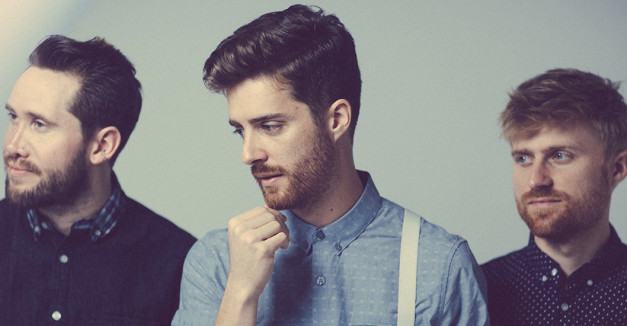After more than 10 years of continuous touring, releasing albums and gaining recognition for a consistently jovial sound, Jukebox the Ghost will see its cheerful music recontextualized in a classic two-dimensional world.
The trio took the time out of a busy touring and recording schedule to transform into cartoon characters for the upcoming Dreamworks television remake of Mr. Peabody and Sherman. The band members will play on the show as themselves, says Jukebox The Ghost’s Ben Thornewill, and will provide the theme song and many of the musical numbers for the sci-fi children’s cartoon.
“It’s such a cool thing. They’re like, ‘Hey, would you want to write a song about black holes and be in our TV show?’” Thornewill says.
The network and release date of the series has not yet been announced.
In the world of their more official releases, Jukebox the Ghost is trying to revive its immensely positive, piano-heavy pop in its 2014 self-titled record, and update it with driving dance beats.
The Washington, D.C. band plays Wednesday night at The Waiting Room with Twin Forks and Secret Someones. RSVP on Facebook here. Catch up on past albums here.
Vocalist/pianist Thornewill says Jukebox the Ghost, their fourth studio album, is a work illustrative of the past decade of consistently recording and touring as a band.
“[This album] sort of reasserts who [we] are, sort of redefines the music that we’re making,” Thornewill says. “We thought that this was an appropriate representation of what we’re trying to do. A self-titled record fit that.”
The 11-track record was Frankensteined from about 50 demos that Thornewill says were a collective of lyrics and instrumentals written at different times — some brewed as ideas for several years, and others were born in the studio while recording the album. He says the discarded dozens of demos will reenter “song purgatory” and will be remembered for future albums.
Jukebox the Ghost’s primary focus in choosing which demos to mature and place into the album was figuring out the story they wanted to tell, Thornewill says of the “tedious” song selection process. He elaborated the songs were also chosen to create a “party all the way through” the record, saying an album can only have so many ballads.
Jukebox the Ghost started with a nearly dinner-theatrical sound in 2008’s Let Live and Let Ghosts, gradually evolving their crisp exultations into indie pop that’s geared for radio airtime. Jukebox the Ghost is the final form of that development.
The dance-pop album replaces some of drummer Jesse Kristin’s percussion with skittering, sampled beats and adds layers of drizzling synth above Thornewill’s piano. Guitarist and vocalist Tommy Siegel dons a bass guitar to deliver backup for the more electronically-concocted tracks.
One quality Jukebox the Ghost refuses to change is the undeniably upbeat optimism that seeps from major chord progressions and soothing harmonies.
An accessible album addressing pop music’s most familiar theme — love — Jukebox the Ghost presents listeners with melancholy tales of heartbreak camouflaged by their usual perky instrumentals. Thornewill says that as a group of self-described “positive individuals,” the band believes in the juxtaposition of happier music in darker lyrics.
“We want to make good music that’s danceable, that’s fun; and when we put on our live show, we want to enjoy performing it,” Thornewill says. “But at the same time, if it’s all just like, ‘yeah, yeah, happy, happy,’ we’d lose our minds trying to say authentic bullshit and no one actually feels that way.”




